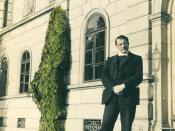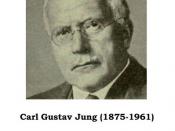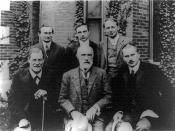Carl Jung is one of the most celebrated psychologists of the 20th century. He is responsible for developing several theories on the unconscious and human psyche, such as the ideas of introversion and extraversion, and the four psychic functions (these various theories will be discussed at length in the next section of this work,) which have influenced not only 20th century psychology, but also philosophy and the arts. His theories also provide one of the most widely accepted alternate views of the human psyche to Freud's popular psycho-sexual approach to the unconscious. To fully understand the theories of Jung, and its fundamental differences from Freud, it is essential to understand the development of his theories, and to do so, requires knowledge of Jung's life and the events which led him to develop his ideas. This essay will attempt to give a brief overview of the life of Carl Jung, and in doing so, to provide greater insight into the roots of Jung's theories and beliefs.
From his earliest years, Jung was exposed to influences which would later impact upon his theories of psychoanalysis. Jung was born on the 26th of July, 1875 in the town of Kessewil, Switzerland, to country parson, Paul Jung, and Emilie Jung. Growing up, Jung was surrounded by a well educated extended family, causing him to follow many intellectual pursuits; for example his father began to teach him Latin at the age of six, and eventually, Jung learnt many different languages, including most western European ones, and the ancient language of Sanskrit. This knowledge and interest increased Jung's exposure to countless sources of mythology and literature, such as the Kabala, I Ching, Buddhism, Gnosticism and alchemy, giving him the foundations that he would base much of his psychoanalysis on.
Jung began a study of medicine on...


